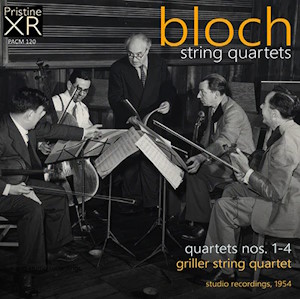
Ernest Bloch (1880-1959)
String Quartet No. 1 (1916)
String Quartet No. 2 (1945)
String Quartet No. 3 (1952)
String Quartet No. 4 (1953)
Griller Quartet
rec. 28 June-20 July 1954, Decca West Hampstead Studios, London
Pristine Audio PACM120 [2CDs: 150]
Bloch is probably currently best remembered for his works showing Jewish influence, such as Schelomo and Baal Shem, but in fact these form only a small proportion of his output. I haven’t explored all of it but I can vouch for the excellence of the Violin Concerto, the two Concerti Grossi, the Piano Quintets and perhaps above all of his cycle of five String Quartets, four of which we have here in classic recordings made by Decca now given the magic treatment by Andrew Rose for Pristine Audio and sounding splendid.
His idiom in these works is modernistic, some way between Berg and Bartók. He has some of the expressionism of Berg, the chromatic writing, the occasional outbursts and the willingness to write in rich textures. He also has Bartok’s rhythmic drive, his gift for melody and his ability to move suddenly from strongly dissonant writing to something lyrical and sweet. In the 1950s good critics classed these quartets with those of Bartók, and the wonder is really that they seem to have dropped out of the repertoire completely.
The first quartet is a huge work, lasting over fifty minutes and establishing the composer firmly in the tradition of quartet writing. I found myself thinking of Schoenberg’s first numbered quartet, which has something of the same role in his work. Bloch’s opening movement is a bridge between the Jewish works and a more abstract language, being a Lamento in an expressive, chromatic idiom. This is followed by a ferocious Allegro frenetico, though the Trio of this scherzo has an exotic colour. The third and fourth movements are both titled Pastorale, with the third being an anguished slow movement and the finale bringing jagged themes and also the return of that of the Lamento.
The first is a fine work, but the second, which came many years later, is even finer and possibly Bloch’s quartet masterpiece. Bloch wrote it after having studied Beethoven’s sketches for the Eroica symphony in detail in preparation for some teaching. His quartet has something of Beethoven’s fierce beauty, close working and great power. The first movement begins with a winding chromatic line on the viola which leads to some Bartókian contrapuntal writing – think of the first movement of his Music for Strings, Percussion and Celesta. The following Presto is fierce and enigmatic, the slow movement a lament in an idiom more romantic than expressionist and the finale a kind of passacaglia which turns into a fugue and eventually reaches triumph and serenity.
The third quartet begins with a driving rhythm which breaks off for a lyrical episode before a sudden end. The second is very beautiful in an uncomplicated way. The third is jolly, even jaunty and the finale begins with a stentorian call to action, then some quiet musings before a vigorous Allegro.
The fourth quartet begins Tranquillo which alternates with an Allegro energico. The following Andante is a charming and gentle song. The scherzo is fierce and the finale begins and ends calmly but with some agitation in the middle.
The Griller Quartet was a leading quartet of the time. They premiered Bloch’s last three quartets and were the dedicatees of the third. They sound completely inside this music, which has many odd quirks and tricks to play. The recording is in good clear mono, slightly close, and the sound has cleaned up well. There was a previous reissue on CD, by Decca in 2004 (review). The second quartet is split across the two discs, but any other way of distributing the works would have meant an extra disc. The booklet note simply reprints a Gramophone review of the recording of three of the quartets. It is a shame that Decca never invited the Grillers to record Bloch’s last quartet, which was written after these recordings were made.
There are two other recordings of the set of all five quartets: the long-lived Pro Arte Quartet recorded them for the Laurel label, who recorded a great deal of Bloch, and the Portland Quartet did so for Arabesque. Both these sets were made in the 1980s and so are stereo and, I think, digital. I haven’t heard the Pro Arte set but I have the Portland one and it too is very good, and it has the approval of the composer’s daughter Suzanne, herself also a musician. She wrote the sleevenotes for that set, on which I have drawn for this review. I am not aware of any integral set since then. However, the Grillers will always have a special place because of their closeness to the composer and their return is to be welcomed.
Stephen Barber
Availability: Pristine Classical


















